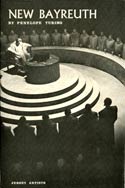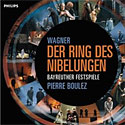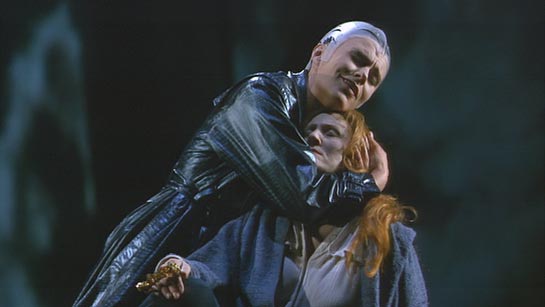Der Ring des Nibelungen at the Bayreuth Festival - all the productions
Richard Wagner's main work is the tetralogy Der Ring des Nibelungen. Wagner wrote the libretto and music between 1848 and 1874. The four operas that constitute the Ring cycle are: Das Rheingold (The Rhine Gold), Die Walküre (The Valkyrie), Siegfried and Götterdämmerung (The Twilight of the Gods).
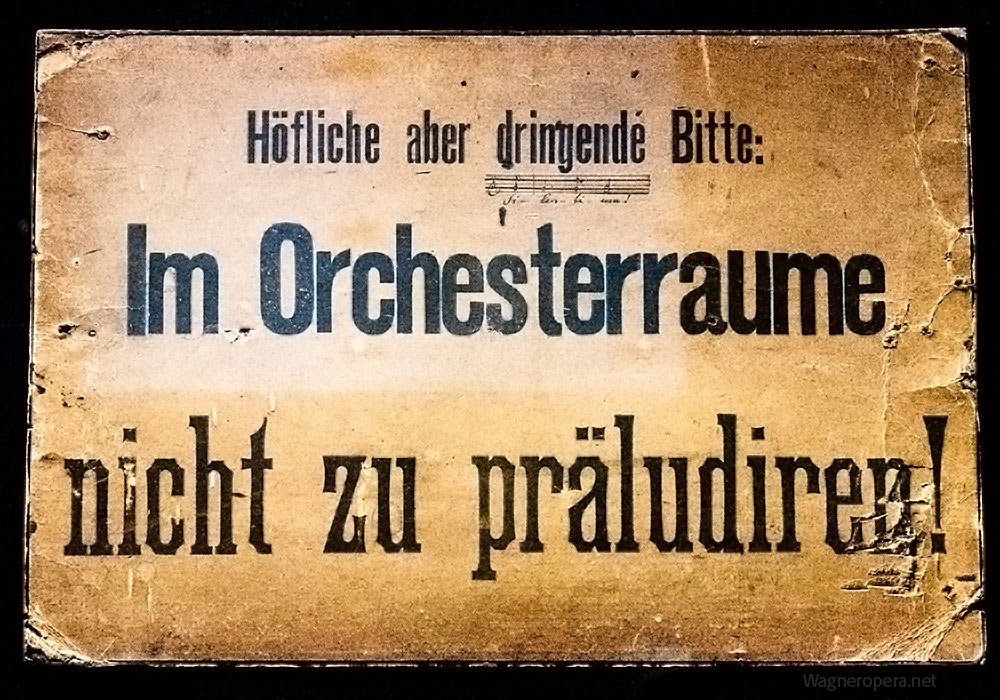
1876 (3 cycles) - Richard Wagner
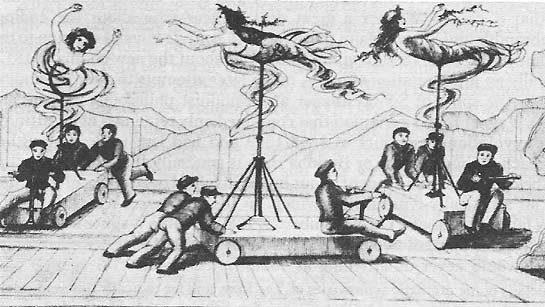
Stage director
Richard Wagner
Conductor
Hans Richter
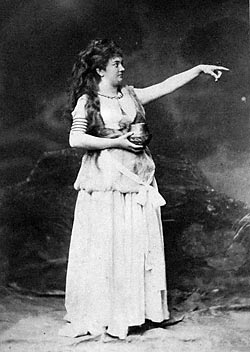
Josephine Scheffsky as Siegline in Die Walküre 1876.
"Bayreuth’s special and much praised acoustic is actually only fully functional in Parsifal. It is certainly also one of the reasons why Wagner uses a style that is far closer to chamber music for this work. In the earlier pieces, composed for other stages, but also in the Ring, which elaborates far denser structures than Parsifal, and especially in Die Meistersinger too, one is aware that the Bayreuth acoustic is by no means ideal since it blurs the contrapuntal element of these works."
Hartmut Haenchen
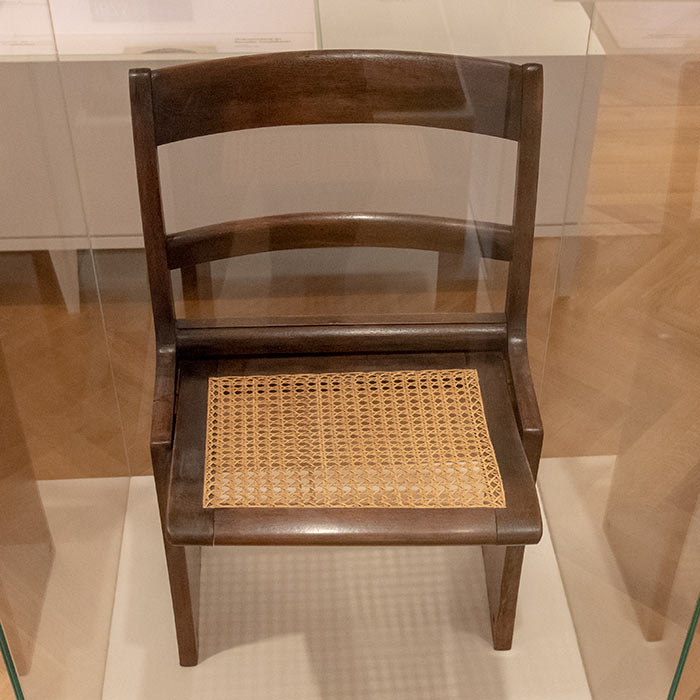
The first chairs at Bayreuth looked like this. (Villa Wahnfried Museum)
1896-1914 (29 cycles) - Cosima Wagner
Stage director
Cosima Wagner (co-director from 1901: Siegfried Wagner)
Conductors
Felix Mottl (1896)
Hans Richter (1896, 1897, 1901, 1902, 1904, 1906, 1908)
Siegfried Wagner (1896, 1897, 1899, 1901, 1902, 1906)
Franz Beidler (1904)
Michael Balling (1909, 1911, 1912, 1914)
1924-1931 (14 cycles) - Siegfried Wagner
Stage director
Siegfried Wagner
Conductor
Michael Balling (1924, 1925)
Franz von Hoesslin (1927, 1928)
Siegfried Wagner (1928)
Karl Elmendorff (1930, 1931)
1933-1942 (18 cycles) - Heinz Tietjen
Stage director
Heinz Tietjen
Conductors
Karl Elmendorff (1933, 1934, 1942)
Heinz Tietjen (1934, 1936, 1938, 1939, 1941)
Wilhelm Furtwängler (1936, 1937)
Franz von Hoesslin (1940)
This was the first Ring not to be directed by a Wagner family member.
1951-1958 (16 cycles) - Wieland Wagner
Stage director
Wieland Wagner
Conductors
Herbert von Karajan (1951)
Hans Knappertsbusch (1951, 1956, 1957, 1958)
Joseph Keilberth (1952, 1953, 1954, 1955, 1956)
Clemens Krauss (1953)
Das Rheingold (Premiere 31 July 1951): Hans Knappertsbusch
Die Walküre (Premiere 1 August 1951): Hans Knappertsbusch
Siegfried (Premiere 2 August 1951): Hans Knappertsbusch
Götterdämmerung (Premiere 4 August 1951): Hans Knappertsbusch
1960-1964 (11 cycles) - Wolfgang Wagner
Stage director
Wolfgang Wagner
Conductors
Rudolf Kempe (1960, 1961, 1962, 1963)
Berislav Klobucar (1964)
Principal singers
Hermann Uhde/Theo Adam / Jerôme Hines / Otto Wiener / Hans Hotter (Wotan), Gerhard Stolze (Loge), Otakar Kraus (Alberich), Jutta Meyfarth (Sieglinde), Gottlob Frick (Hunding and Hagen), Birgit Nilsson / Astrid Varnay (Brünnhilde), Hans Hopf (Siegfried), Herold Kraus / Erich Klaus (Mime)
Before his Bayreuth debut as Ring director, Wolfgang Wagner had already directed the Ring at La Fenice in Venice. The basic visual elements were a concave and a convex disc, symbolizing the world of the gods and the Nibelungs. During the final bars of Götterdämmerung the destroyed disc was restored. Wolfgang Wagner wanted to have two naked people, but this was too bold for its time, according to Wolfgang. (See Wolfgang Wagner: Lebens-Akte, p. 208-209)
For this Ring Wolfgang used a large concave disc – in German the Scheibe – which was soon nicknamed the saucer. But it did not remain a platform. It was also symbolic of the story, starting as the placid bed of a pool in the Rhine, it was later split and segments of it set at different angles. Each scene used the Scheibe in a different form, often roofed by a companion disc in various broken sections. Strife and suffering mark the development of the saga, and this design depicted the tumult of passions and events in bold, jagged shapes, until at the very end when the Rhinemaidens have regained their golden talisman, when all passion is spent and peace heals the passing of gods and men, the great disc sank back into its first simplicity. Bare and smooth it lay, under a silvery blue light. Of all the Rings I have seen in many different operahouses this was by far the fines ending of Götterdämmerung.
Penelope Turing: New Bayreuth (p. 63)
1965-1969 (12 cycles) - Wieland Wagner
Stage director
Wieland Wagner
(1968-69: Hans Hotter)
Conductors
Karl Böhm (1965, 66, 67)
Otmar Suitner (1966, 67)
Lorin Maazel(1968, 69)
Das Rheingold (Premiere: 25 July 1965): Karl Böhm
Die Walküre (Premiere: 26 July 1965): Karl Böhm
Siegfried (Premiere: 28 July 1965): Karl Böhm
Götterdämmerung (Premiere: 31 July 1965): Karl Böhm
1968-1969
“For the 1968 and 1969 Bayreuth Festival Wolfgang Wagner invited Hotter to take over the production of his brother's Ring cycles. Wieland Wagner's second Ring production was first staged in 1965. By then his artistic development had passed from the stark simplicity of the early '50's to a dramatic symbolism which often did violence to his grandfather's instructions, initiating a fashion for changing the balance of the characters, and down-grading the gods; this has been carried to extremes by later producers in more recent years.
After Wieland's death his Ring was supervised by Peter Lehmann in 1967. Wolfgang had plans for a new Ring of his own which was given at Bayreuth in 1970, but for the two intervening festivals he handed over the direction to Hans Hotter.
This can have been no easy task. Wieland's work was the most talked of aspect of Bayreuth, and there were passionate feelings both for and against his innovations among the regular public. It was not a case of taking over former sets and creating a new dramatic vision within them; Hans had known Wieland well for many years, valued his help and inspiration and admired much though not all of his work.
In these Ring productions he adhered scrupulously to Wieland's overall conception, his decor, symbolism, and most of his stage directions. Hotter added to, rather than changed the whole. For he brought to it his own gifts of enhancing the characters, of helping each individual artist to create a living being.
The result was a very definite enrichment of the meaning of the great saga. Where Wieland's later work had tended to make the characters puppet-like in the development of the story, symbols rather than people, Hotter's hand reinstated them as people, mortal or immortal, and thereby released in the artists concerned and the audience the personal meaning and poignancy of Richard Wagner's music. There was a marked difference in the Wieland Wagner – Hotter Rings, but it was a psychological one, not superficially apparent.” (Penelope Turing: Hans Hotter. Man and Artist, p. 185f)
Principal singers
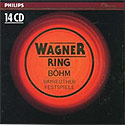
Theo Adam, Wolfgang Windgassen, Gustav Neidlinger, Erwin Wohlfahrt, Martti Talvela, Gerd Nienstedt, Gerhard Stolze, Zoltán Kelemen, Birgit Nilsson, James King, Leonie Rysanek, Josef Greindl, Thomas Stewart, Martha Mödl
"I was bowled over. It was the year after Wieland Wagner had died; to be able to see his productions was a total knock-out. These bare stagings, where everything was done with lighting. The light changed with the music, and the shadows and patterns seemed as archetypal as the music itself. Nobody had done that on the stage before. I thought it was extraordinary and wonderful."
(Patrick Carnegy to The Guardian)
1970-1975 (16 cycles) - Wolfgang Wagner
Stage director
Wolfgang Wagner
Conductor
Horst Stein (1970, 71, 72, 73, 74, 75)
Principal singers
Heinz Zednik (Mime), Thomas Stewart / Theo Adam / Donald McIntyre (Wotan), Hermin Esser (Loge), Gustav Neidlinger / Franz Mazura (Alberich), Marga Höfgen (Erda), Karl Ridderbusch (Fasolt), Kurt Moll (Fafner), Catarina Ligendza / Gwyneth Jones (Brünnhilde), Gwyneth Jones / Marita Napier (Sieglinde), Karl Ridderbusch (Hunding), Jean Cox (Siegfried), Franz Mazura (Gunther), Janis Martin / Eva Randová (Gutrune)
1976-1980 (16 cycles) - Patrice Chéreau
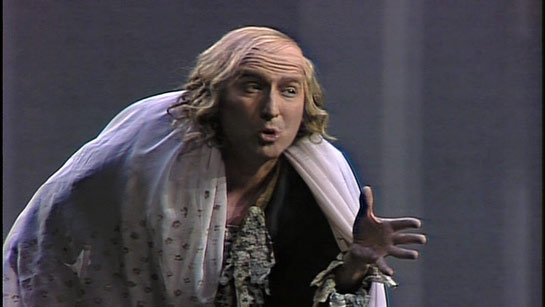
Stage director
Patrice Chéreau
Conductor
This was the second Ring not directed by a Wagner family member. The first one was Heinz Tietjen's production running 1933-1942.
Principal singers
Donald McIntyre, Gwyneth Jones, Jeannine Altmeyer, Manfred Jung, Heinz Zednik, Siegfried Jerusalem, Hermann Becht, Helmut Pampuch, Matti Salminen, Fritz Hübner, Hanna Schwarz, Peter Hofmann
Written about Patrice Chéreau's Ring
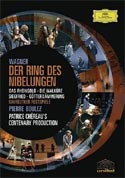
Although some of the costumes may today look unavoidably ”1970s” in theatrical taste, Chéreau’s wonderful production remains an indisputable reference for all later Rings, and even (as the author J L Borges might have said) for all earlier ones as well! Today I can see that Chéreau’s emotionally intelligent ”Personenregie” is even more important than his historical re-reading of the drama. In his humanization of the roles, he brings out psychological nuances, ambivalences, doubts and desires that are matched (and surpassed) only by the relational complexity of the musical score itself.
Boulez’s famous transparency in orchestral texture, his rhythmic precision, lighter tempos, and his preference for woodwinds over strings, all contribute to a Gallic clarity of interpretation, evoking a modernist understanding pointing back to early French wagnerism and to Baudelaire’s aesthetical writings on Wagner in the 1860s. Still, in his conducting, Boulez is less avant-garde, less distanced and more emotionally expressive than he used to be before his Bayreuth experience started in 1966.
This Ring comes out extremely well on DVD, not least due to its humour, and to Brian Large’s magnificent TV production with its frequent close-up filming.
Erling E. Guldbrandsen
For anyone who would accuse Boulez of being a ‘cold’ conductor, listen to Act One of Die Walküre, once again with an unforgettable – not least visually – Siegmund and Sieglinde from Peter Hofmann and Jeannine Altmeyer. This is some of the most passionate Wagner one will ever see and hear. Boulez’s phenomenal ear clarifies textures yet, like Karajan, he is perfectly willing to broaden the scale and to intensify the emotional level when required. There is a host of other memorable performances, not least Donald Macintyre’s Wotan and Gwyneth Jones’s Brünnhilde. Yet it is the epoch-making nature of the production, resulting initially in death-threats for Boulez and Chéreau, which truly makes this mandatory viewing. Chéreau’s Personenregie is more or less unrivalled. His connection of the drama to its nineteenth-century political and social context is never didactic and often, even now, quite revelatory. Joachim Herz may have done something not entirely dissimilar in Leipzig but now the rest of the world had the opportunity to witness a searing mythological, historical, and contemporary drama, which unfolds mesmerizingly from the opening mise-en-scène (designer: Richard Peduzzi) of a Rhenish hydroelectric dam. Wagner production was transformed forever.
Mark Berry
1983-1986 (12 cycles) - Peter Hall
Stage director
Peter Hall
Conductor
Georg Solti(1983)
Peter Schneider (1984, 85, 86)
Principal singers
Hildegard Behrens, Siegmund Nimsgern, Siegfried Jerusalem
1988-1992 (15 cycles) - Harry Kupfer
Waltraud Meier (Waltraute) and Anne Evans (Brünnhilde) in Götterdämmerung.
Stage director
Harry Kupfer
Conductor
Daniel Barenboim
Das Rheingold (1991)
Wotan: John Tomlinson
Donner: Bodo Brinkmann
Froh: Kurt Schreibmayer
Loge: Graham
Clark
Alberich: Günter von Kannen
Mime: Helmut Pampuch
Fasolt: Matthias Hölle
Fafner: Philip Kang
Fricka: Linda Finnie
Freia: Eva Johansson
Erda: Birgitta Svendén
Woglinde: Hilde Leidland
Wellgunde: Annette Küttenbaum
Flosshilde: Jane Turner
Die Walküre (1991)
Siegmund: Poul Elming
Sieglinde: Nadine Secunde
Brünnhilde: Anne Evans
Wotan: John Tomlinson
Hunding Matthias Hölle
Fricka: Linda Finnie
Gerhilde: Eva Johansson
Ortlinde: Ruth Floeren
Waltraute: Shirley Close
Schwertleite: Hitomi Katagiri
Helmwige: Eva-Marie Bundschuh
Siegrune: Linda Finnie
Grimgerde: Birgitta Svendén
Rossweisse: Hebe Dijkstra
Siegfried (1992)
Der Wanderer / Wotan John Tomlinson
Brünnhilde Anne Evans
Mime Graham Clark
Erda Birgitta Svendén
Alberich Günter von Kannen
Fafner Philip Kang
Waldvogel Hilde Leidland
Götterdämmerung (1991)
Brünnhilde Anne Evans - see interview here
Siegfried Siegfried Jerusalem
Hagen Philip Kang
Alberich Günter von Kannen
Gunther Bodo Brinkmann
Gutrune Eva-Maria Bundschuh
Waltraute Waltraud Meier
Woglinde Hilde Leidland
Wellgunde Annette Küttenbaum
Flosshilde Jane Turner
1. Norne Birgitta Svendén
2. Norne Linda Finnie
3. Norne Uta Priew
Waltraud Meier on Harry Kupfer's Ring production at Bayreuth
Denken Sie an Harry Kupfers grandiosen Bayreuther "Ring des Nibelungen". Bei diesen klugen und dabei emotional intensiven Bildern, bei denen stets ein Element des Gesamtkunstwerks ins andere greift, war ich ergriffen. Dagegen ist vieles heute nur noch banal, oberflächlich, läppisch und im Grunde moderner Kitsch. (Waltraud Meier ïnterviewed by Die Welt)
Comments on YouTube about Harry Kupfer's Ring production at the Bayreuth Festival
This is my favourite version of the Ring on DVD. I am a traditionalist, but this production changed my mind somewhat. Taking away the armour allowed the actors to create more realistic characters with their movement and actions. This production (1988) was also highly influential on the making of the movies Dark City and the Matrix. It is also the best sounding Ring on DVD.
What a silly and ugly production. I wonder whether Wagner would recognize his own work (apart from the Music, of course)
The producer has obviously not listened to the music. You can hear the flames in every note, and this hack comes up with laser beams? A shame that modern rings have become so tawdry.
This is probably my favourite portrayal of Siegmund and Sieglinde I have seen. It is for me one of the most truthful realisations of their journey together.
From a purely musical point of view, the performance is not bad, but the directing, the costumes ... and not talk about those antipathetic singers…
This was the worst Ring production I have ever watched. Mostly because of staging and the silly costume design.
I went to see this same performance in Bayreuth. To date to me this still is the most memorable of all performances! It was simply magical and I loved every moment of it!
I didn't know Wotan was a pimp. He sure dresses like one.
Out of the three "Rings" I've seen, this at the top.
1994-1998 (15 cycles) - Alfred Kirchner
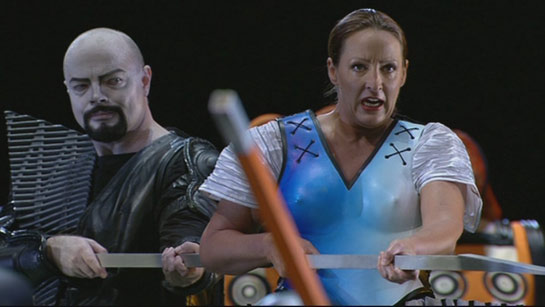
Stage director
Alfred Kirchner
Conductor
James Levine
Only Götterdämmerung is available on DVD.
2000-2004 (15 cycles) - Jürgen Flimm
Stage director
Jürgen Flimm
Conductor
Giuseppe Sinopoli (2000)
Adam Fischer (2001, 02, 03, 04)
2006–2010 - Tancred Dorst
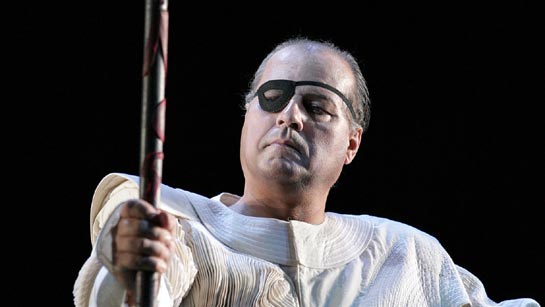
Photo: Jörg Schulze
Stage director
Tankred Dorst
Conductor
Christian Thielemann
Principal singers
Albert Dohmen, Linda Watson, Kwangchul Youn, Eva-Maria Westbroek, Andrew Shore, Stephen Gould.
Sources
- Philippe Olivier: Der Ring des Nibelungen in Bayreuth von den Anfängen bis heute
- Wagners Werk und Wirkung
- Penelope Turing: New Bayreuth
- Bayreuther Festspiele Homepage
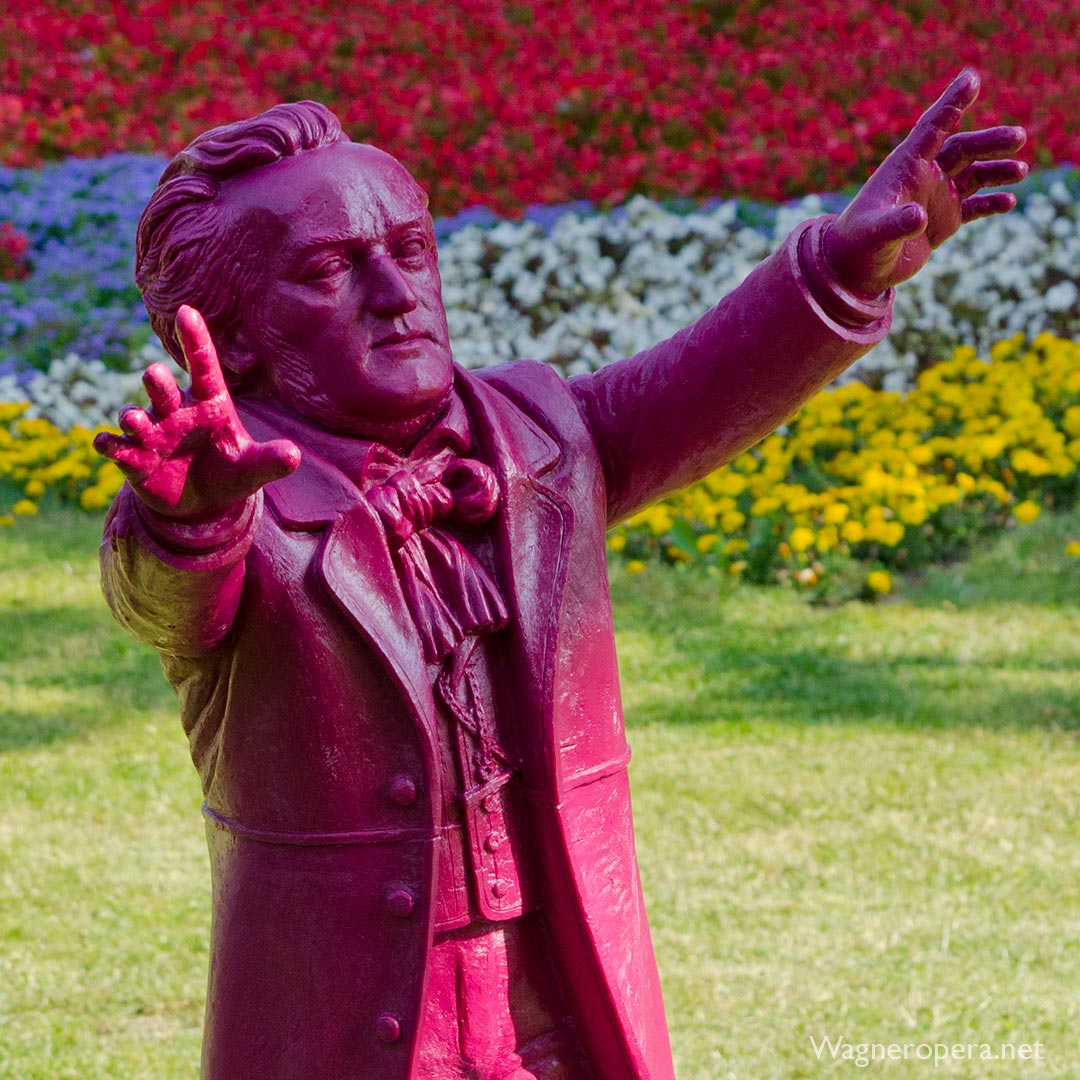
2013-2017
Stage director
Das Rheingold Cast 2013
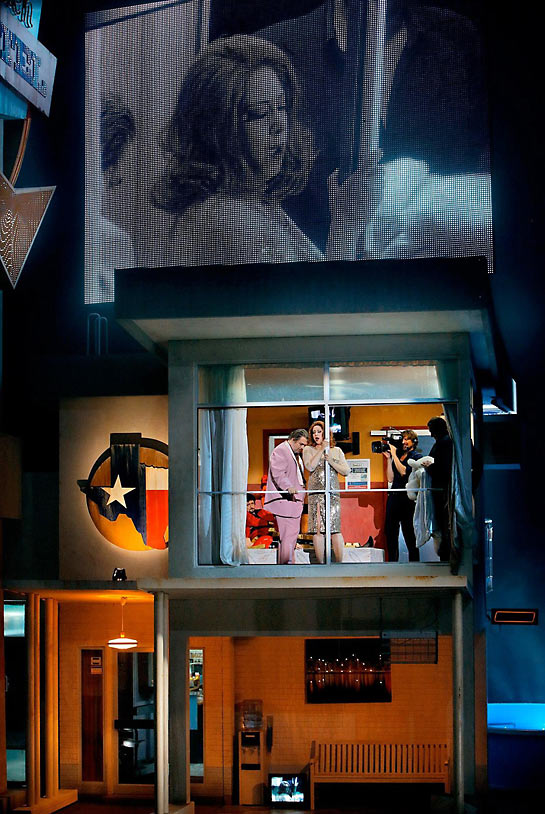
Aleksandar Denic’s magnificent scenography in each of the operas offers unlimited possibilities for vertical scenic activity. The intrigues of the gods are set against brash Western popular culture. Photo: Enrico Nawrath / Bayreuther Festspiele
Conductor Kirill Petrenko; Director Frank Castorf;
Stage design Aleksandar Denić;
Costumes Adriana Braga Peretzki;
Lighting Rainer Casper;
Video Andreas Deinert and Jens Crull
Wotan Wolfgang Koch;
Donner Oleksandr Pushniak;
Froh Lothar Odinius;
Loge Norbert Ernst;
Fasolt Günther Groissböck;
Fafner Sorin Coliban;
Alberich Martin Winkler;
Mime Burkhard Ulrich;
Fricka Claudia Mahnke;
Freia Elisabet Strid;
Erda Nadine Weissmann;
Woglinde Mirella Hagen;
Wellgunde Julia Rutigliano;
Flosshilde Okka von der Damerau
Die Walküre Cast 2013
Conductor Kirill Petrenko; Director Frank Castorf;
Stage design Aleksandar Denić;
Costumes Adriana Braga Peretzki;
Lighting Rainer Casper;
Video Andreas Deinert and Jens Crull
Siegmund Johan Botha; Hunding Franz-Josef Selig; Wotan Wolfgang Koch; Sieglinde Anja Kampe; Brünnhilde Catherine Foster; Fricka Claudia Mahnke; Gerhilde Allison Oakes; Ortlinde Dara Hobbs; Waltraute Claudia Mahnke; Schwertleite Nadine Weissmann; Helmwige Christiane Kohl; Siegrune Julia Rutigliano; Grimgerde Geneviève King; Rossweisse Alexandra Petersamer
Siegfried Cast 2013
Conductor Kirill Petrenko; Director Frank Castorf;
Stage design Aleksandar Denić;
Costumes Adriana Braga Peretzki;
Lighting Rainer Casper;
Video Andreas Deinert and Jens Crull
Siegfried Lance Ryan; Mime Burkhard Ulrich; Der Wanderer Wolfgang Koch; Alberich Martin Winkler; Fafner Sorin Coliban; Erda Nadine Weissmann; Brünnhilde Catherine Foster; Waldvogel Mirella Hagen
Götterdämmerung Cast 2013
Conductor Kirill Petrenko; Director Frank Castorf;
Stage design Aleksandar Denić;
Costumes Adriana Braga Peretzki;
Lighting Rainer Casper;
Video Andreas Deinert and Jens Crull
Siegfried Lance Ryan; Gunther Alejandro Marco-Buhrmester; Hagen Attila Jun; Alberich Martin Winkler; Brünnhilde Catherine Foster; Gutrune Allison Oakes; Waltraute Claudia Mahnke; 1. Norn Okka von der Damerau; 2. Norn Claudia Mahnke; 3. Norn Christiane Kohl; Woglinde Mirella Hagen; Wellgunde Julia Rutigliano; Flosshilde Okka von der Damerau
The Rhine Daugthers and Brünnhilde outside the Stock Exchange on Wall Street. Götterdämmerung. During “Starke Scheite” one of the Rhinedaughters carries a painting (Picasso?) out of the Stock Exchange building. Should we read this as a manifesto that art must free itself from commerce?
Photo: Enrico Nawrath / Bayreuther Festspiele
The Castorf Ring on The Wagner Journal's website
On The Wagner Journal's website you can read an extended essay by Edward A. & Paula M. Bortnichak on Frank Castorf's Ring production at Bayreuth. The authors discuss the bold interpretations of Wagner's works at Bayreuth over the last decade in the context of deconstructionist approaches to literature and theatre, concluding with a dramaturgical analysis of the Castorf Ring. This landmark article should prove invaluable to anyone intending to see the production, but will also make stimulating and enlightening reading for anyone interested in the staging of Wagner's works in the modern era.
2022– (Valentin Schwarz / Cornelius Meister)
![]()
Photo: Enrico Nawrath / Bayreuther Festspiele
Valentin Schwarz (director)
Andrea Cozzi (designs)
Andy Besuch (costumes)
Konrad Kuhn (dramaturgy)
Reinhard Traub (lighting)
Luis August Krawen (video)
The cast 2022
Das Rheingold
Wotan – Egils Silins
Donner – Raimund Nolte
Froh – Attilio Glaser
Loge – Daniel Kirch
Fricka – Christa Mayer
Freia – Elisabeth Teige
Erda – Okka von der Damerau
Alberich – Olafur Sigurdarson
Mime – Arnold Bezuyen
Fasolt – Jens-Erik Aasbø
Fafner – Wilhelm Schwinghammer
Woglinde – Lea-ann Dunbar
Wellgunde – Stephanie Houtzeel
Flosshilde – Katie Stevenson
Bayreuth Festival Orchestra
Cornelius Meister (conductor)
Die Walküre
Siegmund – Klaus Florian Vogt
Hunding – Georg Zeppenfeld
Wotan – Tomasz Konieczny, Michael Kupfer-Radecky
Sieglinde – Lise Davidsen
Brünnhilde – Iréne Theorin
Fricka, Schwertleite – Christa Mayer
Gerhilde – Kelly God
Ortlinde – Brit-Tone Müllertz
Waltraute – Stéphanie Müther
Helmwige – Daniela Köhler
Siegrune – Stephanie Houtzeel
Grimgerde – Marie Henriette Reinhold
Rossweiße – Katie Stevenson
Grane – Igor Schwab
Bayreuth Festival Orchestra
Cornelius Meister (conductor)
Bayreuth Productions
Ring Productions at the Bayreuth Festival
Der Ring des Nibelungen: Articles and Reviews
Nila Parly on Regietheater: Visions of the Ring
The Cry of the Valkyrie: Feminism and Corporality in the Copenhagen Ring
Sam Goodyear, Bayreuth 2022: Der Ring des Nibelungen (Valentin Schwarz)
Mark Berry, Bayreuth 2022: Das Rheingold (Valentin Schwarz)
Mark Berry, Bayreuth 2022: Die Walküre (Valentin Schwarz)
Mark Berry, Bayreuth 2022: Siegfried (Valentin Schwarz)
Mark Berry, Bayreuth 2022: Götterdämmerung (Valentin Schwarz)
Mark Berry: Bayreuth 2017: Das Rheingold (Frank Castorf / Marek Janowski)
Mark Berry: Bayreuth 2017: Die Walküre (Frank Castorf / Marek Janowski)
Mark Berry: Bayreuth 2016: Das Rheingold (Frank Castorf)
Mark Berry: Bayreuth 2016: Die Walküre (Frank Castorf)
Mark Berry: Bayreuth 2016: Siegfried (Frank Castorf)
Mark Berry: Bayreuth 2016: Götterdämmerung (Frank Castorf)
Mark Berry: Bayreuth 2014: Das Rheingold (Frank Castorf)
Mark Berry: Bayreuth 2014: Die Walküre (Frank Castorf)
Mark Berry: Bayreuth 2014: Siegfried (Frank Castorf)
Mark Berry: Bayreuth 2014: Götterdämmerung (Frank Castorf)
Per-Erik Skramstad: Bayreuth 2013: There Will Be Blood: Frank Castorf Has Entered the Ring
Per-Erik Skramstad: Bayreuth 2010: Curtain Down on Tankred Dorst's Ring
Mark Berry: 2010 Cassiers Ring
Sam Goodyear: Laufenberg’s Wiesbaden Ring 2017
Jerry Floyd: Rheingold, Metropolitan 2010
Jerry Floyd: Die Walküre, Metropolitan 2010
Jerry Floyd Washington National Opera: Siegfried
Jerry Floyd Washington National Opera: Siegfried II
Jerry Floyd Washington National Opera: Götterdammerung Concert (2009)
Jerry Floyd Washington National Opera: Götterdammerung Concert (2009)
Mark Berry: Richard Wagner für Kinder – Der Ring des Nibelungen (2011)
‘It is not I who conducts Parsifal faster but rather you in Bayreuth who have got slower and slower. Believe me, what you are doing in Bayreuth is all wrong.’
Richard Strauss
So there was much in 1876 that could never be repeated – Wagner, of course, in his full creative power and the splendid setting of Bayreuth that gave us such freedom for expression. As Rhine-maidens we played our part to the full – gay and capricious of mood at the beginning of Rheinhold and grave in our solemn warning to Siegfried in the last act of Götterdämmerung. And here I must mention that I always sang in my part in Rheingold – ‘Nur wer der Minne Macht entsagt’ never versagt as I always heard it sung later. I drew Levi’s attention to this in 1884 at Munich, when he wanted me to sing ‘versagt’ instead of ‘entsagt’.
Lilli Lehmann in her memoirs
“When I need my Bayreuth ears, I have to cut my normal ears off, and then someone puts the new ears on,” said Mr. Thielemann, who tends to speak poetically. “At the end of the summer, the new ears are cut off, and then I have my old ears back.” (Christian Thielemann in The New York Times)

